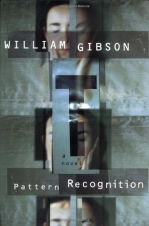Pattern Recognition
A book review.

Pattern Recognition
by William Gibson
published: 2003.02
ISBN: 0399149864
genre: Sci-Fi
reviewed:2003.06.20
👍🏼 recommended
Gibson is one of my favourite authors, and one of those authors whose work inspired me to attempt to write my own fiction. Over the years, Gibson's science fiction has broken new ground in both style and content. His work always includes considerable detail regarding such things as the cultural context of the characters (clothing, music, lifestyle) in a way that helps convey the character's motivation and adds considerable richness to the story's development. Also, his early work explored the quite a bit of the landscape of the odern computing world, from user interfaces to cybernetic concepts to the effects of the Internet on day to day living.
As time has gone on, his novels have consistently involved protagonists that remain likeable and sympathetic despite sometimes criminal interests and a tendency to be losers in general. I find this far more appealing than those (especially early) works of science fiction where the protagonist is either invincible, uncannily gifted, perpetually lucky, or all three.
Within Pattern Recognition, many of these elements are present. The main character is a freelance specialist in logos and iconography. She has a mental quirk where she gets unspoken instinctive reactions to certain visual cues, such as getting physically and mentally anguished at the sight of a certain tubby white cartoon spokesicon.
Recently, she's become interested in a series of short video clips that have been released to the public in a piecemiel, anonymous fashion. Her interest in that series, and skills in finding workable patterns and at researching information land her a job working for a party interested in locating the font of the body of work.
So she sets to it, and winds up in the sort of jet-setting-and-alley-living adventure that could only be Gibson. Along the way, Gibson stoops to throwing in current cultural references (yes, we all saw "the Phantom Edit"), but this is probably more an attempt to marry his usual 'cultural context' to the current day.
I typically re-read Gibson's works several times, and as I write this I'm considering starting from scratch with Neuromancer once again.